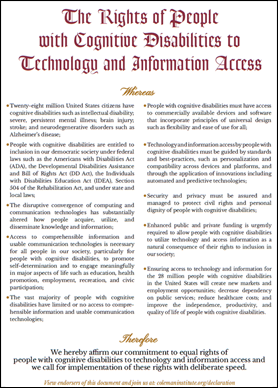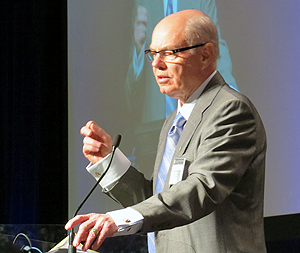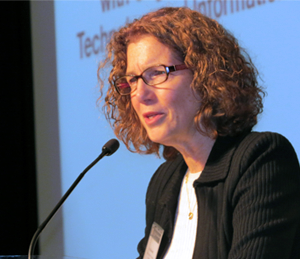Coalition: People with cognitive disabilities have equal right to technology, information access
A declaration asserting the need for equality in technology and information access for the 28 million Americans with cognitive disabilities was unveiled Wednesday at the 13th Annual Coleman Institute National Conference on Cognitive Disability and Technology at the Omni Interlocken in Broomfield.
The formal statement, titled “The Rights of People with Cognitive Disabilities to Technology and Information Access,” asserts the rights of all people to inclusion and choice in relation to technology and information access, specifically via the platforms and devices delivering it, e.g. mobile phones, computers, TV and radio. The principles already are endorsed by organizations including conference co-sponsors the American Association on Intellectual and Developmental Disabilities (AAIDD), the Arc of the United States, and the American Network of Community Options and Resource (ANCOR), as well as a broad coalition of disability organizations and individuals.
David Braddock speaks Wednesday in Broomfield at the Coleman Institute for Cognitive Disabilities Conference. (Photo: Jay Dedrick/University of Colorado)
“We all need to get behind this declaration,” said David Braddock, Ph.D., in unveiling the document at the conference, attended by 450 people. Braddock, the conference chair, is professor of psychiatry and executive director of CU’s Coleman Institute. “If we find limitations, we need to correct them. … I see it as a living document and a largely democratic document.
“At the same time, we need to not be overly aggressive with the way we advance this. We need to be diplomatic and effective.”
The University of Colorado’s Coleman Institute for Cognitive Disabilities was established in 2001 by the Board of Regents following a private endowment and sustained annual contributions by founding donors William T. and Claudia L. Coleman.
Because communication technologies have undergone such sweeping changes in recent years, people with cognitive disabilities are at a distinct disadvantage when accessing information that’s vital to education, health promotion, employment, recreation and civic participation, the declaration states. By ensuring such access via appropriate devices and platforms, the U.S. has the potential to stimulate the economy, decrease dependency on public services, cut health care costs – and improve lives.
“Access to technology and information has become as essential to everyday life as access to education has been,” Braddock said. “It took litigation and legislation over a generation to begin to level the education playing field.
“I don’t necessarily think it will take litigation to level the technology playing field, but if it does we must be ready.”
Cognitive disabilities include intellectual and developmental disabilities, autism spectrum disorders, severe and persistent mental illness, brain injury, stroke, Alzheimer’s disease and other dementia. People with cognitive disabilities make up more than 60 percent of the world’s total estimated population of people with disabilities. The vast majority of people with cognitive disabilities have limited or no access to comprehensible information and usable communications technologies.
Enid Ablowitz, associate director of the Coleman Institute, kicks off the 13th annual conference. (Photo: Jay Dedrick/University of Colorado)
The declaration was displayed onstage on a large poster unveiled by Enid Ablowitz, associate director of the Coleman Institute; immediately following the launch, panelists took up a discussion of why the initiative is vital and why it’s under way now.
“We know that employment is a huge obstacle to people if you can’t get into the Internet for the application process,” said Marty Ford, J.D., senior executive officer, public policy, The Arc, a national advocacy organization. “If you can’t access the information technology, employment is basically a closed door to you. That’s just one example of why technology has to be accessible to people.”
Margaret Nygren, Ed.D., executive director and CEO of the American Association on Intellectual and Developmental Disabilities, called the declaration a “statement of existing rights that have been given to all people, but seen under the lens of ‘times have changed.’”
Peter Blanck, Ph.D., J.D., professor and chairman of the Burton Blatt Institute at Syracuse University, said, “If the Web is denied, then that avenue for participation in democracy is denied.”
The panelists also acknowledged challenges and practical barriers that will make it difficult to achieve the declaration’s goals. Braddock set the tone in his opening remarks, quoting from a speech by John F. Kennedy: “We choose to go to the moon not because it is easy, but because it is hard.”
Achieving broader improvements to access likely will require congressional action, Ford said.
“As you can well see, Congress doesn’t work together in many ways,” she said, alluding to this week’s federal government shutdown. “There are stalemates and a lot of partisanship. Anything that costs money these days is very difficult to pass.”
Blanck pointed to the need for patience and tenacity in pursuing goals, citing legal cases against Target stores (aiming to improve job application processes for visually impaired people) and CNN (to provide more accessible communication of news on its website for hearing-impaired people). Victories in such cases often come only in increments, after many failed attempts, Blanck said.
Mark Emery -- executive director of Imagine!, a Louisville-based nonprofit that supports people with disabilities – called for conference attendees to not only visit the declaration’s website to state their support, but also for them to copy and paste the link into any social media platforms they use.
“Challenge your friends to join this movement,” Emery said. “If we all do our part, we have the potential for 50,000 endorsements in as few as 48 hours. We can do this. It’s not difficult, but we all have to participate.”
Said Braddock, “If we have enough minds to send people to the moon and other galaxies now … we have the capacity to move forward aggressively in this area and create great things.”




